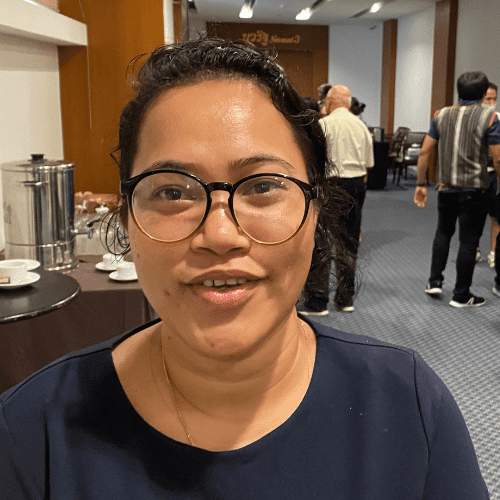
Retina Rongpipi belongs to the Karbi Indigenous community and was born and brought up in Karbi Anglong District in the North Eastern part of India. She leads the gender cell and youth division of Karbi Human Rights Watch (KHRW). KHRW works closely with the Asia Indigenous Peoples Pact (AIPP).
Growing up as an Indigenous person in India made Retina aware of subtle and explicit discrimination experienced by Indigenous peoples. This led to her involvement in human rights advocacy in the early stages in her life.
“I saw gender imbalance and discrimination against women in schools, colleges, and workplaces. So it triggered me to work with the women and youths.”
Retina has facilitated training sessions on youth, child and women’s rights in her work. She was also involved in the high-profile Elephant Corridor Advocacy Campaign in the Nilip Constituency in Karbi Anglong. This involved securing recognition for the rights of Indigenous communities in the context of securing safe migration corridors for increasingly endangered elephants.
Retina has a high opinion of the DTP training:
“The training has given me a lot. Especially, the design of the training was fabulous. It gave me time to absorb the teaching materials and enabled me to build my network with like-minded advocates from other parts of the world participating in the training. We still use DTP training materials in our work in India.”
Retina says that participating in DTP training has also given her hope and inspiration for the future. In addition to the global experience and the networking with other advocates, Retina developed an appreciation of the Timorese struggle for self-determination.
“In the training, I came to know about the history of Timor-Leste. Before participating in the training, we were told about the struggle of the Timorese people. I was so touched after learning about the sacrifice of the Timorese people, and I was also very inspired. That story gave me the strength to keep going and not give up our advocacy because growing up as an Indigenous person in India is tough. There is much discrimination. It is tough to deal with some policies, sometimes advocacy could be unsuccessful, that could be disheartening, but the history of Timorese people keeps my hopes alive and reminds me that sometimes the struggle and setbacks are also ways of moving forward.”
Retina said she was also inspired by the Timorese women she saw using traditional weaving skills, especially the Tais that DTP gives to acknowledge trainers and participants. She has taken this back to her community and has been helping women and children there in North East India develop their own skills in traditional handicrafts.
Retina would love to collaborate with DTP in training youth and women in the future.
DTP acknowledges the traditional custodians of the land on which we work, the Bedegal people of the Eora Nation. We recognise their lands were never ceded, and we acknowledge their struggles for recognition and rights and pay our respects to the Elders – past, present – and the youth who are working towards a brighter tomorrow. This continent always was and always will be Aboriginal land.
Aboriginal and Torres Strait Islander peoples should be aware that this website contains images or names of people who have passed away.
DTP acknowledges the traditional custodians of the land on which we work, the Bedegal people of the Eora Nation. We recognise their lands were never ceded, and we acknowledge their struggles for recognition and rights and pay our respects to the Elders – past, present – and the youth who are working towards a brighter tomorrow. This continent always was and always will be Aboriginal land.
Aboriginal and Torres Strait Islander peoples should be aware that this website contains images or names of people who have passed away.
Privacy Policy | Terms of Use | Disclaimer | Policies
© 2022 Diplomacy Training Program | ABN 31 003 925 148 | Web Design by Studio Clvr